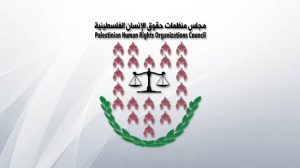 On 22 June 2015, the UN-established Commission of Inquiry on the 2014 Gaza Conflict (CoI) issued a report on its findings of serious international law violations that took place during the course of military operations in the Occupied Palestinian Territory since 13 June 2014. In light of the report, the Palestinian Human Rights Organizations Council (PHROC) again highlights the devastating impact that Operation Brother’s Keeper and Operation Protective Edge had on Palestinians, including the death of 2,217 individuals, the majority of whom were civilians and included 556 children, and the continued need for full accountability for the international law violations that took place in the course of the operations.
On 22 June 2015, the UN-established Commission of Inquiry on the 2014 Gaza Conflict (CoI) issued a report on its findings of serious international law violations that took place during the course of military operations in the Occupied Palestinian Territory since 13 June 2014. In light of the report, the Palestinian Human Rights Organizations Council (PHROC) again highlights the devastating impact that Operation Brother’s Keeper and Operation Protective Edge had on Palestinians, including the death of 2,217 individuals, the majority of whom were civilians and included 556 children, and the continued need for full accountability for the international law violations that took place in the course of the operations.
PHROC organizations supported the mandate of the Commission of Inquiry since it began its work in September 2014. This cooperation included: presenting written submissions; facilitating meetings between Palestinian victims from the West Bank and the Gaza Strip with the CoI in Amman, Jordan and via video-conference; and, by meeting with the CoI in Geneva. PHROC therefore welcomes the account of facts that the report provides as a result of its investigations. The report echoes our longstanding call for accountability on behalf of victims.
During the CoI’s reporting period, PHROC remained concerned that the CoI could not enter the OPT due to Israel’s non-cooperation, and that other state and non-state actors would influence its work. Upon the resignation of the former CoI Chair, Professor William Schabas, PHROC issued a statement condemning Israel’s constant attempts to obstruct the mandate of the Commission generally, as well as its continued policy to undermine the work of other UN bodies and experts. PHROC underscores the undoubted impact such a policy has had on the work of the CoI, and notes the course of the Goldstone UN Fact-Finding Mission as an example of how an independent body and its experts may be pressured both during and after the conclusion of its work.
The report of the Commission highlighted some of the most serious crimes committed against civilians throughout the OPT, including several incidents that were characterized as systematic and wide-spread in nature. Unfortunately, although the gravity of the incidents was clear, a sense of anxiety and treading lightly permeates through the report, where situations that are disparate are made equal. Definitive language that was used in examining the illegality of acts attributed to Palestinian armed groups was left vague when examining whether certain acts by Israel constituted international crimes. Similarly, the CoI did a disservice to Palestinian victims by failing to acknowledge that Israeli policies and practices ‘spread terror among the civilian population’ in the Occupied Palestinian Territory.
In order to ensure justice for victims, PHROC supports the recommendations in the CoI report, and calls for them to be promptly and genuinely implemented. The report urged the revision of military policies, such as the use of explosive weapons in densely populated areas and the so-called Hannibal doctrine. This suggests that responsibility for violations against civilians may lie within the military and political leadership that planned, approved, and implemented such policies and not just the operational military personnel. PHROC strongly believes that ensuring the accountability of those with command responsibility is crucial in order to guarantee non-repetition of these crimes and ensure respect for the provisions of the Geneva Conventions, as established in Common Article 1.
Likewise, PHROC reiterates the CoI’s finding that “impunity prevails across the board for violations” of international law committed by Israeli forces, and that “Palestinian victims are systematically denied their right to effective remedies and reparations.” PHROC therefore underlines the CoI’s call to the international community to “support actively the work of the International Criminal Court (ICC) in relation to the Occupied Palestinian Territory” and to “exercise universal jurisdiction to try international crimes in national courts.” These mechanisms are critical to end the continued denial of justice faced by Palestinian victims. PHROC urges the ICC’s Office of the Prosecutor to make use of the report’s findings in moving forward with its preliminary examination.
As noted in the report, the prolonged occupation and the manner in which it manifests must also be addressed. The CoI in particular called on Israel to “lift, immediately and unconditionally, the blockade on Gaza; to cease all settlement-related activity…and to implement the advisory opinion rendered on 9 July 2004 by the International Court of Justice on the legal consequences of the construction of a wall” in the OPT. Issues of collective punishment and widespread human rights violations were also highlighted by the CoI. PHROC calls upon UN bodies and the international community at-large to take concrete measures to ensure that Israel fulfills its obligations under international law. PHROC consequently urges the Human Rights Council (HRC) to endorse the report and to comply with the report’s recommendation that the HRC considers “conducting a comprehensive review of the implementation of numerous recommendations addressed to the parties by its own mechanism and to explore mechanisms to ensure their implementation.”
Last, PHROC emphasizes that the issuance of the report provides another crucial opportunity for the international community to closely examine past and continuing events in the Occupied Palestinian Territory, to give due weight to information in the report on incidents that may amount to war crimes and crimes against humanity, and to proceed in a manner that not only respects the rights of victims but also ensures that such violations will not be repeated.



 On 22 June 2015, the UN-established Commission of Inquiry on the 2014 Gaza Conflict (CoI) issued a report on its findings of serious international law violations that took place during the course of military operations in the Occupied Palestinian Territory since 13 June 2014. In light of the report, the Palestinian Human Rights Organizations Council (PHROC) again highlights the devastating impact that Operation Brother’s Keeper and Operation Protective Edge had on Palestinians, including the death of 2,217 individuals, the majority of whom were civilians and included 556 children, and the continued need for full accountability for the international law violations that took place in the course of the operations.
On 22 June 2015, the UN-established Commission of Inquiry on the 2014 Gaza Conflict (CoI) issued a report on its findings of serious international law violations that took place during the course of military operations in the Occupied Palestinian Territory since 13 June 2014. In light of the report, the Palestinian Human Rights Organizations Council (PHROC) again highlights the devastating impact that Operation Brother’s Keeper and Operation Protective Edge had on Palestinians, including the death of 2,217 individuals, the majority of whom were civilians and included 556 children, and the continued need for full accountability for the international law violations that took place in the course of the operations. 










